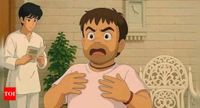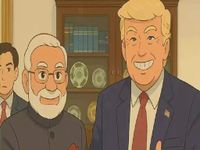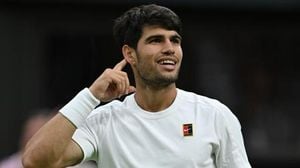A series of AI-generated Studio Ghibli-style images featuring Prime Minister Narendra Modi has taken social media by storm, igniting both excitement and controversy. The artwork, shared by MyGovIndia, creatively reimagines Modi in key political and cultural moments, showcasing the potential of AI in the realm of digital art.
OpenAI CEO Sam Altman acknowledged the trend, revealing that demand for the image generation tool has reached unprecedented levels. The overwhelming popularity of the feature prompted Altman to announce temporary usage limits on March 30, 2025, stating, "Our GPUs are melting," as the infrastructure struggled to keep up with the surge in user activity.
ChatGPT's Ghibli-style image generator, powered by OpenAI's GPT-4o model, was initially exclusive to paid subscribers. However, it was rolled out to free-tier users on March 29, 2025, allowing them to create enchanting visuals inspired by Studio Ghibli's iconic animation style. In just one hour after the launch of the free feature, ChatGPT added one million new users, marking a significant milestone for the platform. Altman remarked, "The ChatGPT launch 26 months ago was one of the craziest viral moments I'd ever seen, and we added one million users in five days. We added one million users in the last hour."
Users have been transforming their photos into whimsical, anime-inspired artworks, flooding the internet with creative and nostalgic content. The Ghibli aesthetic, known for its distinctive hand-drawn textures, soft color palettes, and dreamlike settings, has captivated many. Studio Ghibli, founded in 1985 by Hayao Miyazaki, Isao Takahata, and Toshio Suzuki, is celebrated for beloved classics such as Spirited Away and My Neighbour Totoro.
While the Modi-inspired images have garnered widespread attention, they have also sparked criticism. An old video of Studio Ghibli’s co-founder, Hayao Miyazaki, has resurfaced, in which he strongly opposed AI-generated animation, calling it "an insult to life itself." This stance underscores the ongoing debate over AI's impact on traditional artistry and the ethical implications of using AI tools to replicate established artistic styles.
The viral trend has split opinions online. Some users celebrated the AI's ability to create stunning artwork, while others accused OpenAI of exploiting Studio Ghibli’s signature style without crediting the original creators. One user on X (formerly Twitter) sarcastically commented, "Wow, congrats! Using Ghibli’s work to train your model and Ghibli’s name to promote it really helped you generate huge revenue!" Another added, "ChatGPT didn’t just go viral. It inverted the interface of intelligence. Suddenly, people could build, learn, and explore faster than institutions. That wasn’t hype; that was a tectonic shift."
However, the excitement surrounding the Ghibli-style image generator has been tempered by privacy concerns. Digital privacy activists have raised alarms, suggesting that users may inadvertently share personal data when uploading photos to create their Ghibli-inspired images. Critics warn that this trend could allow OpenAI to gather thousands of personal images for AI training without users' explicit consent.
Luiza Jarovsky, co-founder of the AI, Tech & Privacy Academy, emphasized the implications of users voluntarily uploading images, stating, "When people voluntarily upload these images, they give their consent to OpenAI to process them." Under GDPR regulations, users must be informed about how their data is collected and used, and Jarovsky pointed out that OpenAI’s privacy policy allows for the collection of personal data unless users opt out.
As users engage with the Ghibli-style generator, the ethical concerns surrounding AI-generated art continue to grow. While AI tools provide new avenues for creativity, questions about originality and artistic integrity persist. The trend highlights a tension between artificial and traditional artistry that remains unresolved.
OpenAI has implemented certain restrictions to manage the overwhelming demand for the tool. Free-tier users are currently limited to generating three images per day, while paid subscribers enjoy higher limits, allowing for greater creative output. This limitation aims to ensure that the platform can accommodate the influx of new users while maintaining service quality.
In addition to OpenAI's developments, Elon Musk's AI chatbot, Grok, has also integrated a Ghibli-style image generation feature, allowing users to create similar artworks for free. However, Grok's privacy policies regarding the retention and use of uploaded images remain unclear, raising further concerns about user data security.
OpenAI has yet to issue a statement addressing the safety of personal data for users utilizing the Ghibli-style AI image art version. When asked about the safety of uploading personal photos, ChatGPT responded, "No, it's not safe to upload personal photos to any AI tool unless you're certain about its privacy policies and data handling practices."
As the popularity of AI-generated art continues to rise, it is crucial for users to remain vigilant about their privacy and the potential implications of sharing personal images online. The Ghibli-style trend serves as a reminder of the delicate balance between innovation and ethical responsibility in the rapidly evolving landscape of artificial intelligence.






